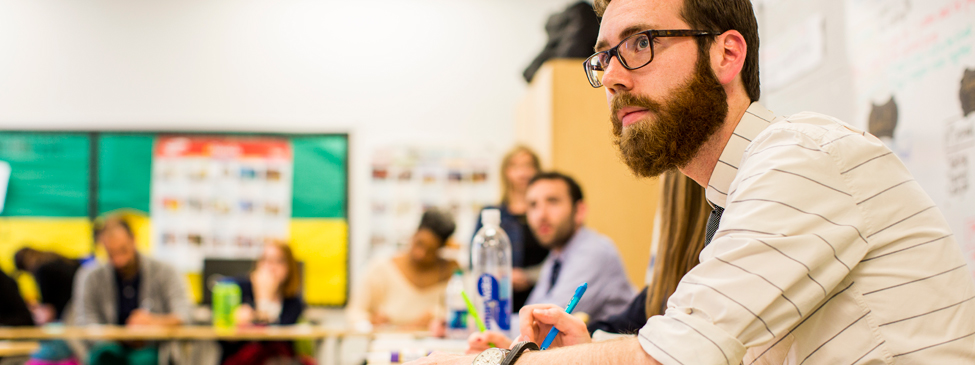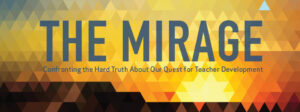Doug McCurry is the co-CEO and Superintendent of Achievement First, a network of 30 public charter schools in New York, Connecticut, and Rhode Island.
How can we help teachers grow and improve?
This is the central question TNTP seeks to answer in its recent report, The Mirage. It’s also a question we ask every day at Achievement First. It’s why we enthusiastically agreed to participate in TNTP’s study, welcoming a closer examination of our bright spots and blind spots so that we could in turn improve and strengthen our current teacher development approach and practices moving forward.
As I reviewed the results of The Mirage, it was clear that we still have A LOT more work to do at Achievement First to ensure all of our teachers are continuously and rapidly improving. But I was also encouraged that the report confirmed that some of our biggest bets are paying off. It’s in that spirit of reflection and learning that I share AF’s guiding principles when it comes to teacher development.
1. A strong culture and growth mindset are paramount.
On the first day of new teacher training, we show a video of Dwayne Wade, a future hall-of-fame basketball player. The video shows him practicing the fundamentals with his coach, who gives Wade feedback in real time. As we debrief the video together, the transferability to teaching becomes clear: If one of the best basketball players of all time—a two-time world champion—practices each day to get better, all of us “mere mortal” teachers can and must do the same. We tell teachers that because we expect our students to take feedback and constantly get better, we have the moral obligation to do the same. It’s next-to-impossible to drive student achievement without unleashing the growth mindset in our students, and it’s definitely impossible to build growth mindset in students if the teachers don’t fully embrace it. From teacher to principal to superintendent, we emphasize that everyone can and must get better—every day.
2. Teachers grow through a virtuous cycle of practice, feedback, practice, and feedback.
No one is born a great teacher—great teachers are made. While it’s true that teaching is not for everyone and that the job comes more naturally to some than others, it’s also true that like any professional in any field—law, medicine, or athletics—becoming great at what you do is an iterative and continuous process. We don’t get better without practice, and feedback is a gift that helps us get there.
On a practical level, for an AF teacher and their coach, this involves a clear-eyed assessment of strengths and growth areas as well as customized plans to help that teacher improve. It requires a strong pre-game plan (deep intellectual preparation and lesson plans pitched to a college-ready bar), mid-game adjustments (frequent observations and real-time coaching), and post-game analysis (post-lesson feedback and a deep review of student work to address gaps in instruction). Most importantly, it involves practice.
When a teacher gets feedback that he or she needs to check for understanding at critical moments of the lesson, or student work analysis reveals that kids aren’t drawing mathematical representations before solving, we don’t just leave it at that. The coach supports the teacher in marking up future lesson plans to address these issues and then practices that portion of the lesson over and over until the teacher is ready for game time (the class).
3. Roles and responsibilities must be clearly defined and laser-focused on instruction.
Traditionally, much of a principal’s and assistant principal’s day ends up being filled with non-instructional activities. At AF, we are clear that driving student achievement through strong teacher development is the primary role of the school leader. The primary role of network support (in addition to ensuring there is a strong curricular foundation) is to develop the skills of leaders in developing teachers. Therefore, a regional superintendent’s primary job is developing and coaching a portfolio of principals. A principal’s primary job is developing and coaching a clear portfolio of deans. A dean’s primary job is developing and coaching a clear portfolio of teachers. And a teacher’s primary job is developing and coaching a classroom of students.
This can’t be a theoretical job description on paper; it needs to be the job in reality—every day. When everyone understands, owns, and executes their role exceptionally well, more times than not, you’re on a winning team.
4. A strategic investment of time, energy, and resources is critical to success.
As a general rule, when someone focuses on something in a thoughtful manner, they get better at it. That’s why, before the school year even starts, all of our teachers engage in two weeks of meaningful professional development (PD) and new teachers engage in an additional one to two weeks on top of that. Every week, each teacher receives two to three hours of PD in addition to coaching on lesson planning and delivery. Every quarter, teachers participate in region-wide PD days to grade and unpack student work together, prepare for future lessons, and practice teaching critical parts of lessons. Our PD ends up being more hours and resources than the other districts surveyed, but we’ve yet to find a substitute for meaningful investments of time and we’ve made painful choices to allocate our limited resources in this way.
So, the question remains: How can we help our teachers get better? Some things we know, other things we’re still learning. We don’t get it consistently right at AF, but in the end, the reason why we ask ourselves this question so often is because we’re hungry for answers. We also know that the things we do well, we can do even better.
The Mirage’s charge to redefine, reevaluate, and reinvent teacher development is one we must all embrace. At Achievement First, we’re committed to continuous reflection, learning, and growing. We hope others can learn from both our successes and struggles, as we in turn learn from them, and journey together towards delivering on the promise of a high-quality education for all of America's children.



